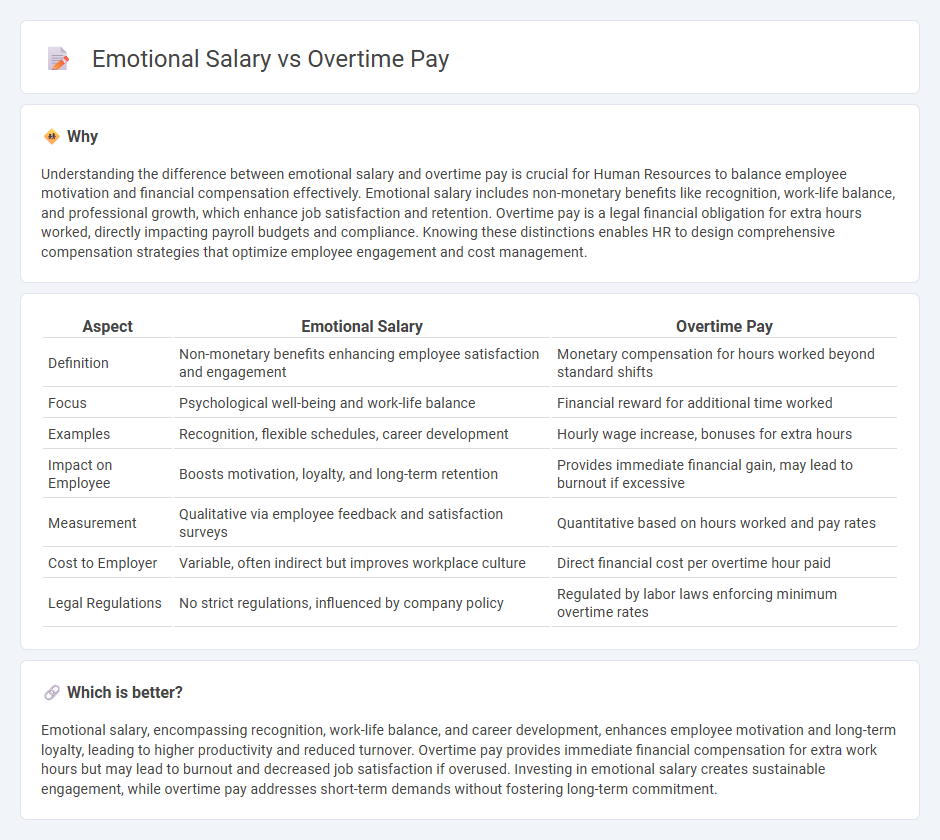
Emotional salary encompasses non-monetary benefits such as recognition, work-life balance, and job satisfaction that enhance employee well-being and motivation, contrasting with overtime pay, which is a direct financial compensation for extra working hours. Companies investing in emotional salary often see increased retention rates and higher productivity, as employees feel valued beyond their paycheck. Explore deeper insights into optimizing rewards strategies for a more engaged workforce.
Why it is important
Understanding the difference between emotional salary and overtime pay is crucial for Human Resources to balance employee motivation and financial compensation effectively. Emotional salary includes non-monetary benefits like recognition, work-life balance, and professional growth, which enhance job satisfaction and retention. Overtime pay is a legal financial obligation for extra hours worked, directly impacting payroll budgets and compliance. Knowing these distinctions enables HR to design comprehensive compensation strategies that optimize employee engagement and cost management.
Comparison Table
| Aspect | Emotional Salary | Overtime Pay |
|---|---|---|
| Definition | Non-monetary benefits enhancing employee satisfaction and engagement | Monetary compensation for hours worked beyond standard shifts |
| Focus | Psychological well-being and work-life balance | Financial reward for additional time worked |
| Examples | Recognition, flexible schedules, career development | Hourly wage increase, bonuses for extra hours |
| Impact on Employee | Boosts motivation, loyalty, and long-term retention | Provides immediate financial gain, may lead to burnout if excessive |
| Measurement | Qualitative via employee feedback and satisfaction surveys | Quantitative based on hours worked and pay rates |
| Cost to Employer | Variable, often indirect but improves workplace culture | Direct financial cost per overtime hour paid |
| Legal Regulations | No strict regulations, influenced by company policy | Regulated by labor laws enforcing minimum overtime rates |
Which is better?
Emotional salary, encompassing recognition, work-life balance, and career development, enhances employee motivation and long-term loyalty, leading to higher productivity and reduced turnover. Overtime pay provides immediate financial compensation for extra work hours but may lead to burnout and decreased job satisfaction if overused. Investing in emotional salary creates sustainable engagement, while overtime pay addresses short-term demands without fostering long-term commitment.
Connection
Emotional salary enhances employee motivation and satisfaction by recognizing non-monetary benefits such as work-life balance and job fulfillment, which directly influences the perception of overtime pay fairness. Fair compensation for overtime work not only addresses financial needs but also impacts employees' emotional engagement and loyalty, reinforcing the value of their additional effort. Integrating emotional salary elements with transparent and adequate overtime pay policies fosters a more committed and productive workforce.
Key Terms
Compensation
Overtime pay directly compensates employees for hours worked beyond their regular schedule, reflecting measurable financial rewards based on labor input. Emotional salary encompasses non-monetary benefits such as job satisfaction, work-life balance, and recognition, which contribute significantly to overall employee motivation and retention. Explore how combining tangible overtime pay with emotional salary strategies enhances comprehensive compensation packages.
Work-life balance
Overtime pay provides direct financial compensation for extra hours worked, enhancing short-term income and motivating employees to invest more time at work. Emotional salary encompasses non-monetary benefits like recognition, flexible schedules, and meaningful work, which significantly improve work-life balance and long-term job satisfaction. Discover how balancing overtime pay with emotional salary strategies can transform your workplace dynamics.
Employee well-being
Overtime pay provides financial compensation for extra work hours, directly impacting employee income and motivation. Emotional salary encompasses non-monetary benefits like recognition, work-life balance, and job satisfaction, playing a crucial role in long-term employee well-being and retention. Explore how balancing overtime pay and emotional salary strategies can enhance overall workforce productivity and happiness.
Source and External Links
Overtime Frequently Asked Questions - This document provides answers to common questions about overtime pay in New York State, including the requirement for 1.5 times the regular rate for hours worked over 40.
Overtime & Exemptions - This webpage explains how overtime pay is calculated and who is exempt from overtime rules in Washington State.
Explaining the Department of Labor's New Overtime Rule - This article discusses recent changes to overtime eligibility impacting millions of U.S. workers and explains the Fair Labor Standards Act's role in setting overtime pay standards.
 dowidth.com
dowidth.com